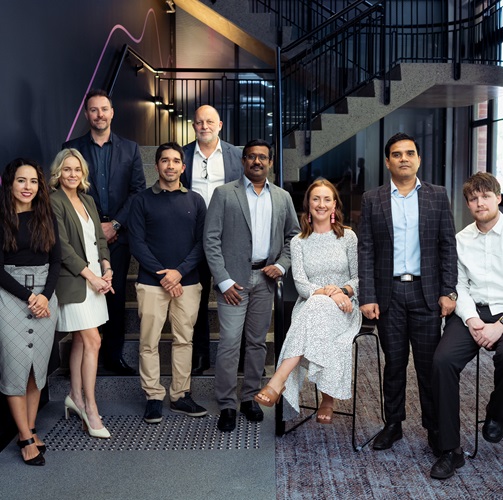28 November 2024

A South Australian startup is on a nation-wide mission to transform client access to allied health services like occupational therapy using artificial intelligence (AI).
Supporting aged care clients and National Disability Insurance Scheme (NDIS) participants, the Ardant platform utilises AI and automation to service a digital marketplace that connects people with verified allied health professionals who are best suited to support their unique care requirements.
Ardant founder and director, occupational therapist Margeaux Bartholomew-Carle, says the technology has the dual-benefit of reducing barriers for vulnerable clients seeking specific allied health services, while enabling therapists to focus on providing care instead of administrative workload.
“Ardant was inspired by a mission to democratise access to top-tier occupational therapy expertise for all Australians,” says Bartholomew-Carle.
“For clients, it simplifies the process of finding and engaging the right therapist, with a quick and easy referral process.
“By outsourcing therapists’ non-clinical tasks, the platform allows them to operate as independent contractors without administrative overheads, increasing efficiency and enabling focus on what matters most: improving lives.
“As a practicing occupational therapist, I’m excited about the genuine impact and empowerment Ardant can deliver for therapists and our clients,” Bartholomew-Carle says.
Ardant is one of six innovative startups to complete this year’s Venture Catalyst acceleration program, delivered by the University of South Australia’s Innovation & Collaboration Centre (ICC). A further two companies completed the program via the ICC’s Global Pathways Program.
The six-month program bolsters startups with funding, industry mentorship and incubation to help them become investment ready and achieve sustainable growth.
For Dr Sean Pickersgill, Dr Damian Madigan, Andrew Lymn-Penning and Darcy Holmes, Venture Catalyst helped advance SiteSeer, a platform that enables visualisation of complex data sets within a three-dimensional (3D) digital environment.
Originally designed as a teaching resource to give students virtual access to building sites, the technology evolved to accommodate architecture and construction settings before being adapted for use in flexible commercial contexts like festival and campus management.
“Australia is in a housing crisis - we’re unable to build enough dwellings for our population,” says Dr Pickersgill.
“One problem is that we can’t attract and train enough apprentices through our current systems: our technology has the capacity to change the learning mode of tradespeople across Australia allowing more people to gain certification.”
“The Venture Catalyst program has given us the opportunity to focus on taking our tools outside the university and into the community, helping solve a critical problem in Australian society today,” Dr Pickersgill says.
UniSA Deputy Director: Business Incubation Craig Jones says the growth trajectory for startups in the Venture Catalyst program is extensive.
“Venture Catalyst supports entrepreneurs with the drive to build an impactful business by bringing together a diverse community of like-minded peers, professional mentors and industry experts,” says Jones.
“In six short months, we see startups making real strides on their journey through customer validation, understanding their markets, and building out their growth strategy.”
“This goes hand-in-hand with the personal development we see - founders are building their knowledge, networks and confidence, preparing them for the journey ahead,” Jones says.
Venture Catalyst participants are supported by a pool of global industry experts as well as a purpose-designed co-working space, $10,000 AUD equity-free funding, tailored workshops, access to university resources and one-on-one mentoring.
The social enterprise category of the Venture Catalyst program is partly funded by the Pank Family, supporting social innovation and enterprises developed by UniSA alumni, students and staff.
2024 Venture Catalyst cohort
|
Venture Catalyst |
|
|
Think It Do It (TIDI) pron. ‘tidy’ |
TIDI is a mobile app for people starting a business offering practical, accessible step-by-step guidance on aspects like planning business ideas, managing finances and reaching customers. |
|
InnovateAI |
InnovateAI presents a user-centric approach to solving business problems with technology so businesses can operate efficiently and effectively to reach their goals. |
|
Ardant |
Ardant’s digital health platform connects clients with allied health providers based on their unique healthcare needs, reducing barriers like wait times. The platform utilizes AI and automation to navigate tasks like referrals, contracts and invoicing to reduce administrative burden on therapists and enable focus on client care. |
|
SiteSeer |
The SiteSeer platform simplifies complex information with spatial computing. It uses the digital capacities of game engine technology to create three-dimensional environments that emulate everyday places like buildings, construction sites, or festivals. This offers a unique learning solution for students and trainees. |
|
Venture Catalyst - Social Enterprise category |
|
|
Critiqal Path Group
|
Critiqal Path Group is a profit-for-purpose social enterprise employing people experiencing disadvantage and barriers to employment. The company provides specialist project management and associated services to industry. |
|
Lumina Vista
|
Lumina Vista guides IT graduates towards successful careers by offering practical knowledge of IT functions, roles, responsibilities, job-ready training and career counselling. |
|
Global Pathways Program |
|
|
Provider360 |
Provider360 is an all-in-one digital platform for National Disability Insurance Scheme (NDIS) and aged care providers, offering efficient registration and growth solutions. |
|
AltData |
AltData generates synthetic datasets enriched with accurate metadata to empower artificial intelligence (AI) and machine learning (ML) algorithms to train faster, addressing the critical need for high-quality training datasets. |
The six-month Venture Catalyst accelerator program runs annually between May and November. Applications for the 2025 program open on Monday, 6 January 2025 and close on Monday, 17 March. Find out more about the program at icc.unisa.edu.au
Media Contact: Leda Kalleske M: +61 412 1758 805 E: leda.kalleske@unisa.edu.au




